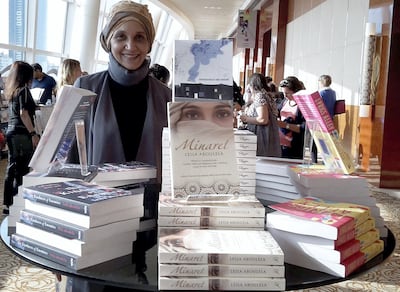There is little reliable data to show that interacting with a post on social media can actually influence a person’s opinion. There is plenty of research, however, that suggests that social media can harden existing beliefs and points of view. This applies to subjects ranging from who to vote for in an election to current conflicts such as in Gaza and Ukraine or even which professional footballer is the true "Goat".
Excessive use of social media can also reduce empathy for others, research suggests. Platforms including X, Facebook, Instagram, TikTok and Snapchat are not effective mediums for changing hearts and minds.
Fiction, in contrast, has been shown to help foster empathy in the reader.
The British magazine The Bookseller this month quoted Mary Mount, publisher at Picador, saying that 2024 is likely to be “one of the richest years for fiction” ever for the UK publishing industry, which is good news for potentially increasing levels of empathy at a time when we acutely feel the deep division and argument bubbling up on social media.

There is a delicious irony at work which is worthy of a book plot. TikTok is changing the face of publishing through "BookTok" – the umbrella term for any content related to books on TikTok – by selling millions more books. It is a vibrant platform for those who love reading fiction.
Some users spoke to The Bookseller recently about their love of books. According to the person behind the @whatbritreads account on TikTok, which has 56,300 followers: “It’s hard for [BookTok] not to be political because the creators are people and life is ultimately political and so are the books we’re reading, even if we’re not consciously aware of it […] Books have always been a very powerful political tool, so of course the communities intertwined with them are going to have strong political beliefs too.”
However, social media is only the tip of the spear of the wider technological changes affecting society. For example, the argument over the application of artificial intelligence has become just as controversial a debate for writers and publishers as it has for other industries and businesses.

The question of whether we should allow its use at all in the creation of books has seemingly been rejected by many writers, agents and editors, according to what is being articulated on X (formerly Twitter). However, Japan’s newest literary sensation has shown it is possible to embrace AI and still ensure the human aspects of creativity remain at the forefront of art.
Rie Kudan, who was awarded the Akutagawa Prize for the best work of fiction by a promising new writer, said part of her novel, The Tokyo Tower of Sympathy, was generated by AI.
“This is a novel written by making full use of a generative AI like ChatGPT, and probably about 5 per cent of the whole text is written directly from the generative AI,” Kudan said, according to The Japan Times.
“I would like to work well with them to express my creativity.”
She said that in her personal life, she consults with ChatGPT about problems she feels she cannot discuss with others.
“When the AI did not say what I expected, I sometimes reflected my feelings in the lines of the main character," she said.
Kudan’s brilliance on the page is the result of a considered and deep process of discovery and understanding. Social media use as a discipline represents the polar opposite process to fiction writing. Perhaps that is why books are shown to be more powerful influencers than social media content, ultimately.
Next week, in Dubai, the Emirates Airline Festival of Literature will have the chance to highlight this trend in person. The event “is a big celebration of books and the stories that live within them. But it's also a platform for important conversations, the kind that go on to impact and shape the world of tomorrow”, according to a post on LinkedIn by its organisers the Emirates Literature Foundation.
Among those scheduled to be part of this celebration are Sudanese novelist and three times nominee of the Women's Prize for Fiction Leila Aboulela, award-winning Kuwaiti author Mai Al-Nakib, celebrated Palestinian poet Dana Dajani, critically acclaimed Pakistani writer Awais Khan, the British "godfather of modern poetry" Roger McGough and Paul Lynch, the Irish author of the Booker prize-winning novel Prophet Song.
The latter is a story about an ordinary family living in a version of Ireland that descends into a civil war. It is eerily reminiscent of what happened in Syria and the writing pulls you right in, as if you are cheek by jowl with the protagonist.
In an increasingly digital world, there is still nothing more immersive than reading a novel.


